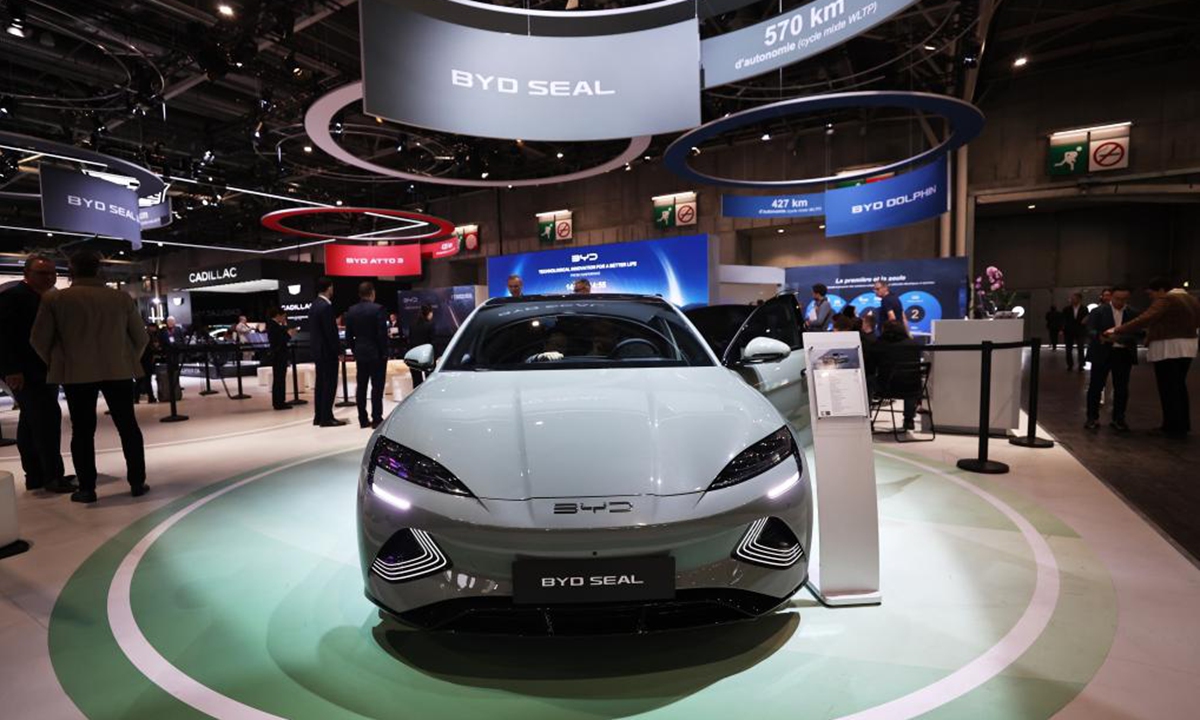
People visit the pavilion of Chinese carmaker BYD at the 2024 Paris Motor Show during the media day in Paris, France, Oct. 14, 2024. (Photo: Xinhua)
Several Chinese electric vehicle (EV) companies have reported an impressive revenue growth in the third quarter, showing that protectionist moves in overseas markets will not hinder China’s EV development, experts said.
In a filing with the Hong Kong Stock Exchange on Thursday, Li Auto said that its total revenue for the third quarter reached 42.9 billion yuan ($6.1 billion), a year-on-year increase of 23.6 percent.
The company reported non-GAAP net income of 3.9 billion yuan in the third quarter, up 11.1 percent from the previous year. It delivered a total of 152,831 vehicles in the third quarter, a year-on-year rise of 45.4 percent.
This comes after BYD, another Chinese EV company, reported its third-quarter earnings on Wednesday, which revealed revenue of 201.125 billion yuan ($28.25 billion), a 24.04 percent increase compared with the same period last year.
Notably, this marks the first time BYD's quarterly revenue has surpassed that of Tesla, which reported third-quarter revenue of $25.18 billion.
SERES Group also released its third-quarter report for 2024 on Wednesday, showing revenue of 41.582 billion yuan in the third quarter, a year-on-year increase of 636.25 percent. The net profit was 2.413 billion yuan.
This stellar performance shows that protectionist
moves by some Western countries to suppress China’s EV industry will not succeed, Cui Dongshu, secretary general of the China Passenger Car Association, told the Global Times on Thursday. China's EV industry will continue to grow, supported by strong domestic demand, Cui said.
Cui noted that the significant growth of Chinese EV companies in the third quarter can be partly attributed to the implementation of trade-in policies, which has greatly boosted the sales of new-energy vehicles (NEVs).
Since July, more than half of all new cars sold in the country have been NEVs, with the rate hitting 53.3 percent in September. Among the participants in the consumer products trade-in program, 62 percent of consumers chose to buy NEVs, the National Development and Reform Commission said in October.
Cui said that the Chinese EV industry has strong growth potential in the domestic market. At the same time, China's supply chain and industrial chain have sufficient resilience and integrity to cope with external challenges.
Relying on its own core technologies, the Chinese EV industry is expected to expand rapidly in the coming years, Zhang Xiang, director of the Digital Automotive International Cooperation Research Center of the World Digital Economy Forum, told the Global Times on Thursday.
In a press release on Tuesday, the European Commission, the executive branch of the EU, said that it had concluded its anti-subsidy investigation by imposing definitive countervailing duties on imports of EVs from China for a period of five years.
Chinese officials, business organizations and carmakers have fiercely criticized this decision, urging the bloc to advance talks to reach a mutually acceptable solution as soon as possible and avert escalating trade friction.




